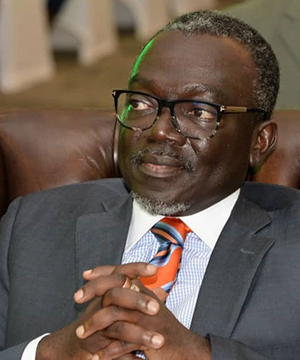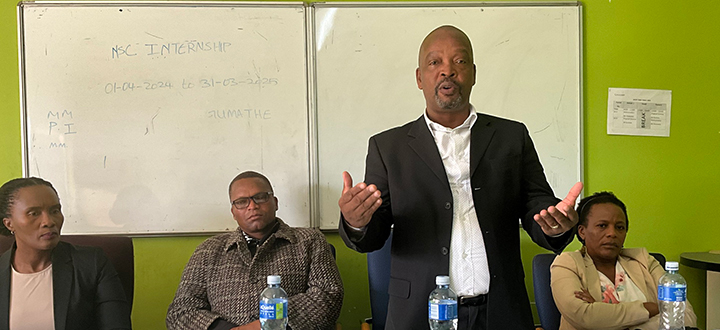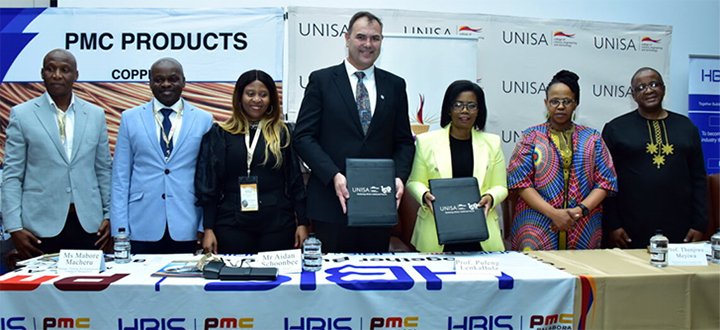News & Media
It's time to adapt

Douglas Boateng is the first-ever Professor Extraordinaire for supply and value chain management in Africa, appointed by the SBL. He is an international chartered director, who also serves as the independent chairman of Ghana’s Public Procurement Authority (PPA). Appointed by President Nana Addo Dankwa Akufo-Addo in 2017, Boateng performs a non-executive supervisory role at the authority to help transform and reposition the organisation in support of Ghana's long-term industrialisation and socio-economic developmental agenda.
The way we gather has changed indefinitely. It's time to adapt. Adapting to a new coronavirus-induced reality will take significant behaviour changes.
Between mid-February and 25 March 2020, a gathering at South Korea’s Shincheonji church accounted for more than 50% of approximately 10 000 Severe Acute Respiratory Syndrome Coronavirus 2 (SAR-COV-2) infections in the country at the time. In the Eastern Cape, 54 people were infected with SAR-COV-2 after attending two funerals in the province. On 9 May 2020, Ghanaian President Nana Akufo Addo announced that one person had infected 533 people at a fish factory in Tema. On 20 May, the Centres for Disease Control and Prevention (CDC) reported that more than 30% of ninety-two people that attended church events in Arkansas, USA, during early March were infected with the coronavirus. Three parishioners died and an additional 26 cases linked to the church spread into the community.
The above-mentioned cases of infection, along with many others, illustrate the propensity of the coronavirus to spread from one infected individual to numerous contacts and community members. The World Health Organisation (WHO) has explained that the transmission of the virus can occur through direct contact with infected people and indirect contact with surfaces or objects in the immediate environment of the infected person. Additional peer reviewed scientific research shows that it takes just one SAR-COV-2 carrier and possibly an asymptomatic individual to easily and innocently "super spread" the virus within a community.
Close-contact interactions now "high risk"
It is looking increasingly likely that the way we group together to revel in our beliefs, mourn, entertain, educate and discharge functional duties within the workplace will be changed indefinitely. While some restrictions are beginning to be relaxed, it is highly likely that large gatherings and social "get-togethers" will be restricted for some time to come, or at least until herd immunity or a vaccine for SAR-COV-2 has been developed.
Adapting to this new coronavirus-induced reality will take significant attitudinal and behaviour changes. For now, experts like University of Massachusetts’ Prof Erin Bromage, George Washington University’s Prof Jonathan Renier, as well as Prof Stephen H Powis, national medical director for England, in the National Health Service, predict that unless humanity adapts to new forms of interactions and strictly adheres to proven WHO guidelines the coronavirus will continue with its rampant spread within the global community.
Without any doubt, close familial, friendship and social interactions help us to navigate the complex journey of life. These interactions have been significantly restricted as social distancing and gathering restrictions have been in place over the past few weeks. Before the arrival of SAR-COV-2 such gatherings, where people came into close contact with each other, were relatively harmless. Sadly, these types of close-contact interactions are now deemed "high risk".
Covid-19 fatalities globally and in Africa as a percentage of recorded infections on 2 June 2020 were 5.9% and 2.84% respectively. In South Africa, it was 1.97%. In all cases, the risk of fatality is particularly high for the elderly and vulnerable in society.
Older generations the most vulnerable
The WHO has recently reiterated the adverse implications that SAR-COV-2 infections can have on the elderly and vulnerable in society - especially those with comorbid conditions. Data from John Hopkins University, Harvard University and many more experts, have demonstrated the almost defencelessness of the elderly and people with comorbidities to the coronavirus.
WHO data indicates that as of April 2020 more than 95% of Covid-19 global deaths were among people aged 60 years and over. In Sweden, over 90% of all deaths, according to WHO, were people over 70 years of age. In South Africa well over 50% of the over 600 fatalities are over 50 years of age. The current recovery rate of around 52% is above the global and African rates of approximately 45% and 43%, respectively.
Based on these statistics, experts, including Epidemiologist Prof Salim Abdool Karim; WHO Regional Director Europe, Dr Hans Kluge; US Presidential Advisor on Covid-19 and Director of NIAID, Dr Anthony Fauci; the South African Minister of Health Dr Zweli Mkhize; and others have insisted that older generations are the most vulnerable to the worst effects of the Covid-19 disease and should be protected from the virus.
Although the elderly have been highlighted as being most vulnerable to severe Covid-19 complications, it is an accepted fact that SAR-COV-2 does not differentiate between the young and old.
Children are just as susceptible to contracting the virus, although the symptoms may not present as severely. As such, possibilities of transmission in large educational gatherings, where one asymptomatic child or student has the potential to innocently infect his/her classmates who then "unintentionally transport" the coronavirus home and pass it on to their family and community remains a concern for many.
How quickly to lift social gathering restrictions
With so much still unknown about SAR-COV-2, the big dilemma facing many governments is when and how quickly to lift or reduce social gathering restrictions knowing the potential unintended consequences of indiscipline and passive resistance, especially on the aged and vulnerable in society as well as public healthcare systems that are not in a position to cope with any sudden major upsurge in Covid-19 cases.
Our ability to coexist with the coronavirus is largely related to our ability to adapt to new forms of social relations and interactions, and is dependent on our individual actions, citizenry responsibility and vigilance.
As at 2 June 2020, worldwide recovery rate as a percentage of recorded infections was 45.8% and 42.3%. In South Africa it was 48.28%. Our ability to coexist with the coronavirus is largely related to our ability to adapt to new forms of social relations and interactions, and is dependent on our individual actions, citizenry responsibility and vigilance. As governments look for ways to balance lives versus livelihoods, strengthen public health infrastructure and develop interventions to cope with living with the virus, the responsibility lies on each one of us to ensure that we protect one another by respecting social distancing guidelines, wearing face masks and adapting to our constantly evolving new reality.
Although global infection cases are relatively declining, Dr Mike Ryan, Executive Director of WHO, recently pointed out that there could be a second peak of infections if countries relax restrictions too soon.
Therefore, if we ignore the calls for mind-set and behavioural change and the need to respect restriction guidelines encouraged by various leaders, including President Cyril Ramaphosa, it will be at our own peril.
* By Douglas Boateng, Professor Extraordinaire for supply and value chain management in Africa, Unisa Graduate School of Business Leadership (SBL)
Publish date: 2020-06-05 00:00:00.0

 Unisa remains anchored among the waves
Unisa remains anchored among the waves
 Inhlanyelo Hub explores sustainable tourism initiatives in Marico Biosphere Reserve
Inhlanyelo Hub explores sustainable tourism initiatives in Marico Biosphere Reserve
 Unisa KZN Region explores extending university services to KwaMpungose community
Unisa KZN Region explores extending university services to KwaMpungose community
 Unisa's catalytic niche areas provide industry-focused mining innovations
Unisa's catalytic niche areas provide industry-focused mining innovations